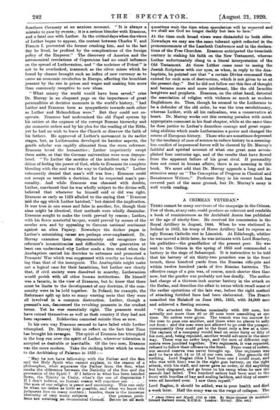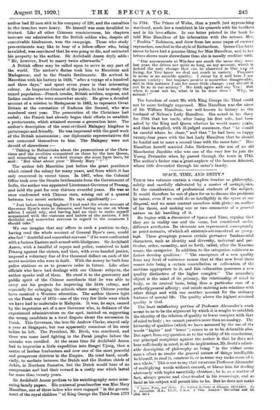A CRIMEAN VETERAN.* THERE cannot be many survivors of the
campaign in the Crimea.
Few of them, at any rate, could produce so coherent and readable a book of reminiscences as Sir Archibald Anson has published at the age of ninety-four. He received his commission in the Royal Artillery in August, 1844. When he was stationed in Ireland in 1852, his troop of Horse Artillery had to repress an ugly Roman Catholic riot'in Limerick. At Edinburgh, whither he was moved a little later, he was intimate with Lord Rosebery, his godfather—the grandfather of the present peer. He was sent to the Crimea in the spring of 1855 and commanded a battery in the siege of Sebastopol. It is instructive to be told that his battery of six thirty-two pounders was in the front trench, three hundred yards from the Russian rifle-pits and within twelve hundred yards of five Russian batteries. The effective range of a gun was, of course, much shorter then than now, but the gunfire was probably not less deadly. The author had charge of a thirteen-inch mortar battery in the attack on the Redan, and describes the affair in terms which recall some of the earlier operations of the late war, before the right method of attacking fortified lines had been elaborated. The French assaulted the Malakoff on June 18th, 1855, with 24,000 men and achieved a fleeting success.
" We attacked the Redan nominally with 300 men, but actually not more than 40 or 50 men were assaulting at one time. No orders were given. The trench was too narrow for the men to pass one another, and there were no places to sally out from : and the men were not allowed to go over the parapet, consequently they could get to the front only a few at a time. The captain of a company would lead on some forty or fifty of his men, and, being.repulsed, another would advance in the same way. There was no order kept, and the men of different regi- ments were jumbled together. Two regiments, it was reported, refused to follow their officers to the front. From want of orders, our second reserve was never brought up. One regiment was said to have shot 14 or 15 of our own men. Our generals did nothing. Lord Raglan (this I had from one I could trust, and who was with him) was in the eight gun battery, on the right attack, with his staff, and never gave an order, or did anything but look disgusted, and go home to his camp when he saw the assault had failed. Two hundred sailors had been sent to the front with bundles of hay and scaling ladders, and they of course were all knocked over. I saw them myself."
Lord Belgian, it should be added, was in poor health and died a week later. Half the army was on the verge of collapse. The • About Others and Myself, 1745 I. 1920. By Major-General Sir Archibald Edward Harbord Anson. B.O.M.G. London: Murray. [21a• net.]
author had 32 men sick in his company of 120, and the casualties in the trenches were heavy. He himself was soon invalided to Scutari. Like all other Crimean reminiscences, his chapters increase our admiration for the British soldier who, despite all conceivable hindrances, won the campaign. Those who study presentiments may like to hear of a fellow-officer who, being invalided, was convinced that he was going to die, and entrusted his property to the author. Sir Archibald Anson dryly adds : " He, however, lived to marry twice afterwards."
A British officer may be called upon to serve in any part of the world. The author's duties took him to Mauritius and Madagascar, and to the Straits Settlements. He arrived in Mauritius with his battery in 1858, "after a voyage of a hundred and three days," and spent seven years in that interesting colony. As Inspector-General of the police, he had to study the mixed population—French creoles, British settlers, negroes, and Indian coolies who were somewhat unruly. He gives a detailed account of a mission to Madagascar in 1862, to represent Great Britain at the coronation of Radama the Second, who was murdered next year. The persecution of the Christians had ended ; the French had already begun their efforts to establish a protectorate, which attained success a generation later. The author's description of the semi-civilized Malagasy kingdom is picturesque and friendly. He was impressed with the good work of the British missionaries ; our diplomatic representatives did not commend themselves to him. The Malagasy were not devoid of shrewdness t- " Talking to Rahaniraka about the persecutions of the Chris- tians and the cruelties committed on them by the late Queen, and remarking what a wicked woman she must have been, he said : But what about your " Bloody Mary " 1' ' "
The author left Mauritius just before the great pestilence which mined the colony for many years, and from which it has only recovered in recent times. In 1867, when the Colonial Office took over the Straits Settlements from the Government of India, the author was appointed Lieutenant-Governor of Penang, and held the post for over thirteen eventful years. He was at once confronted with Chinese riots, arising out of a quarrel between two secret societies. He says significantly :-
"Just before leaving England I had read the whole account of Governor Eyre's riots in Jamaica, and having no one on whose advice I could rely, and having had no time to make myself acquainted with the customs and habits of the nations, I felt doubtful and somewhat nervous in regard to the measures I should take."
We can imagine that any officer in such a position to-day, having read the whole account of General Dyer's case, would also feel doubtful and somewhat nervous " if he were confronted with a furious Eastern mob armed with bludgeons. Sir Archibald .Anson, with a handful of sepoys and police, contrived to hold Penang against the rioters, and then, with even-handed justice, imposed a voluntary fine of five thousand dollars on each of the secret societies who were in fault. With the money he built four police stations so as to preserve order in future. Like other officials who have had dealings with our Chinese subjects, the author speaks well of them. He owed it to the generosity and public spirit of the Chinese merchants that he was able to carry out his projects for improving the little colony, and especially for enlarging the schools where many Chinese youths have received a Western education. The author throws light on the Perak war of 1875—one of the very few little wars which we have had to undertake in Malaysia. It was, he says, caused by the impetuous act of a new Governor who, in defiance of the experienced administrators on the spot, insisted on supporting the wrong candidate in a local dispute about the succession in Perak. This Governor, the late Sir Andrew Clarke, stayed only a year at Singapore, but was apparently conscious of his error before he left. The President, Mr. Birch, was murdered, and there was some hard fighting in the Perak jungles before the mistake was rectified. At the same time Sir Archibald Anson had to improvise a little expedition into Sungei Ujong, then a centre of lawless freebooters and now one of the most peaceful and prosperous districts in the Empire. He tried hard, unoffi- cially, to mediate between the Dutch and the Moslem chiefs of Achim in Northern Sumatra, but the Dutch would hear of no compromise and had their reward in a costly war which lasted for more than twenty years.
Sir Archibald Anson prefixes to his autobiography some inter- esting family papers. His maternal grandmother was Miss Mary Hamilton, one of three ladies who were engaged " in the govern- ment of the royal children " of King George the Third from 1777
to 1784. The Prince of Wales, then a youth just approaching manhood, made her a confidant in his quarrels with his brothers and in his love-affairs. In one letter printed in the book he told Miss Hamilton of his infatuation with the actress, Mrs. " Perdita " Robinson, and drew from her some pages of earnest reproaches, couched in the style of Richardson. Queen Charlotte seems to have had a genuine liking for Miss Hamilton, and in her letters shows more shrewdness than she is usually credited with.
" Our amusements at Windsor are much the same they were last year, the drives not quite so long, on my account, which is indeed the only change• that can be observed in Our way of living, for You know we deal not much in variety. Toujoure la mime is an amiable quality. I swear by it and here I am against variety ; but toujoura perdrix is somewhat disagreeable, and in this instance I am for some little change, l ray should it not be so in our society ? We both agree and say Yes ! But when it must not be, what is to be done then ? Why, to submit ! "
The boredom of court life with King George the Third could not be more feelingly expressed. Miss Hamilton was the niece of Sir William Hamilton, too well known to history as the husband of Nelson's Lady Hamilton. She noted in her diary for 1784 that her uncle, after losing his first wife, had been asked by the King and Queen whether he would marry again, and that he replied, with ill-judged assurance, that " he should be careful whom he chose," and that " he had been so happy twenty-four years with the last Lady Hamilton that he should be fearful not to meet a second time with the same-fate." Miss Hamilton herself married John Dickenson, the son of an old Manchester Jacobite who was one of the very few to join the Young Pretender when he passed through the town in 1745. The author's father was a great-nephew of the famous Admiral, whose title descended through his sister's family.



































 Previous page
Previous page